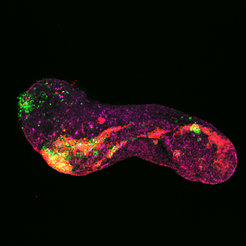“Outstanding Paper” Prize by Scientific Journal Development
Study from Max Planck researchers in Berlin and Dresden recognized as most exciting work published in the journal Development

The scientific journal Development established an “Outstanding Paper Prize” in 2022 to recognize the most exciting work published in the journal each calendar year. Editors chose four finalists and an overall winner. The first edition of this price is awarded to the publication "Hypoxia induces an early primitive streak signature, enhancing spontaneous elongation and lineage representation in gastruloids.” It was selected as the overall winner of the 2022 "Outstanding Paper Prize." The first author of the paper is Natalia López-Anguita from the Max Planck Institute for Molecular Genetics (MPIMG) in Berlin, and the corresponding authors are Aydan Bulut-Karslıoğlu from the MPIMG and Jesse Veenvliet from the Max Planck Institute of Molecular Cell Biology and Genetics (MPI-CBG) in Dresden. The journal "Development" is published biweekly and features studies in the field of stem cell and developmental biology and covers cellular and molecular mechanisms of animal and plant development.
The publication investigates how hypoxia—low levels of oxygen in body tissues—influences cellular signaling pathways during the development of a mouse embryo. Because the placenta, a mammalian invention, is not fully functional until mid-gestation, the mammalian embryo is exposed to hypoxia for several days before and after implantation into the womb. The researchers therefore assessed the impact of prolonged hypoxia on mouse embryo development using mouse stem cells as well as stem-cell-derived three-dimensional models of embryo development, so-called gastruloids. They found that hypoxia induces a gene expression signature that facilitates symmetry breaking and axial elongation, two canonical features of embryo development. Moreover, they discovered that hypoxia impacts cellular differentiation, resulting in gastruloids with a cell type composition more reminiscent of the real embryo. Overall, the results from this study point to the importance of environmental parameters in guiding stem cell choices.
The research labs of Aydan Bulut-Karslıoğlu at MPIMG and Jesse Veenvliet at MPI-CBG are currently working further, using advanced models of embryo development, to understand how hypoxia impacts mammalian embryo morphogenesis and cell differentiation.



![[NEW] - Comparative Analysis of DNA Methylome Conservation Across Species](/4658577/teaser-1697441290.jpg?t=eyJ3aWR0aCI6MzYwLCJoZWlnaHQiOjI0MCwiZml0IjoiY3JvcCIsImZpbGVfZXh0ZW5zaW9uIjoianBnIiwib2JqX2lkIjo0NjU4NTc3fQ%3D%3D--c3f45677a148ea9d0a2aec6e926435e70f05b1bd)
![[NEW] - Chromatin regulation in stem cells and development](/3855034/original-1696838420.jpg?t=eyJ3aWR0aCI6MzYwLCJoZWlnaHQiOjI0MCwiZml0IjoiY3JvcCIsImZpbGVfZXh0ZW5zaW9uIjoianBnIiwib2JqX2lkIjozODU1MDM0fQ%3D%3D--a2913c09d9456699bde795226d5ccaaa3483cf5b)
![[NEW] - Genome Regulation Department](/4561734/teaser-1665058354.jpg?t=eyJ3aWR0aCI6MzYwLCJoZWlnaHQiOjI0MCwiZml0IjoiY3JvcCIsImZpbGVfZXh0ZW5zaW9uIjoianBnIiwib2JqX2lkIjo0NTYxNzM0fQ%3D%3D--aa7a3fb15c921f60c9cf705a7cebe7999ae8b816)






